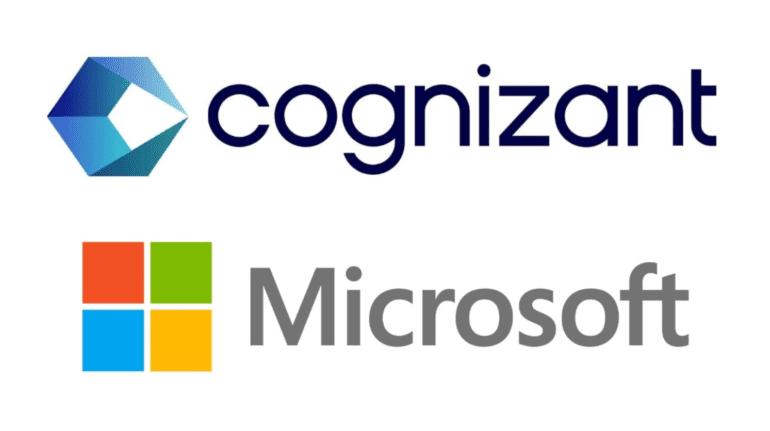- Cognizant and Microsoft join forces to democratize access to Microsoft’s generative AI and Copilots, aiming to revolutionize enterprise operations.
- The partnership seeks to enhance employee engagements, drive cross-industry innovation, and contribute to a projected $1 trillion boost to the U.S. GDP from AI over the next decade.
- Cognizant purchases 25,000 Microsoft 365 Copilot seats for associates and plans to deploy them to a million users across 11 industries.
- The collaboration focuses on developing industry-specific solutions, such as automating tasks for emergency physicians and enhancing customer experiences in various sectors.
- Cognizant’s Advanced AI Lab and AI Innovation Studios will support innovation and co-innovation efforts with clients worldwide.
- Upholding ethical AI deployment standards, Cognizant and Microsoft prioritize safety, security, privacy, transparency, and inclusion.
Main AI News:
In a strategic move poised to reshape the landscape of enterprise operations, Cognizant and Microsoft Corporation have unveiled an ambitious collaboration aimed at democratizing access to Microsoft’s cutting-edge generative AI and Copilots. With a vision to revolutionize enterprise landscapes, enrich employee engagements, and catalyze cross-industry breakthroughs, this partnership heralds a new era of innovation.
Cognizant, renowned for its prowess in digital transformation, stands as a linchpin at the convergence of industry and technology. Teaming up with Microsoft’s advanced generative AI and Copilots, this synergistic alliance holds the promise of delivering profound innovation for enterprise clientele. Forecasts suggest that such innovation could contribute significantly to the anticipated $1 trillion infusion into the U.S. GDP by AI over the next decade. Moreover, the partnership is poised to act as a catalyst in propelling AI adoption and innovation in India, potentially adding USD 450–500 billion to India’s GDP by 2025.
As part of this landmark collaboration, Cognizant has procured 25,000 Microsoft 365 Copilot seats for its associates, alongside 500 Sales Copilot seats and 500 Services Copilot seats. These acquisitions aim to bolster productivity, streamline workflows, and revolutionize customer experiences. Moreover, Cognizant pledges to extend the reach of Microsoft 365 Copilot to a million users within its global 2000 clients spanning 11 industries. Through its acclaimed Synapse skilling program, Cognizant is poised to equip 35,000 developers with expertise in Github Copilot, with an additional 40,000 developers earmarked for training.
“Generative AI holds the transformative potential to redefine the essence of businesses across diverse sectors,” remarked Ravi Kumar S, CEO of Cognizant. “Our substantial investment of $1 billion in generative AI over the next three years underscores our commitment to unlocking unprecedented avenues of innovation, efficiency, and growth for our clients. Microsoft Copilot stands as a testament to this commitment, offering a proven solution poised to unleash transformative dividends.”
Judson Althoff, Microsoft’s executive vice president and chief commercial officer, echoed this sentiment, emphasizing the transformative impact of the expanded partnership. “Our collaboration with Cognizant signifies a pivotal step towards harnessing the full potential of generative AI to drive operational excellence, elevate employee experiences, and deliver unparalleled value to customers,” remarked Althoff.
Central to the partnership’s agenda is the pursuit of industry-specific transformation, aimed at rejuvenating sectors that have long remained impervious to disruption. For instance, recent research from Cognizant and Oxford Economics highlights the potential for generative AI to automate a significant portion of tasks for emergency physicians, thereby alleviating staffing constraints and enhancing service quality.
Looking ahead, Cognizant and Microsoft are poised to collaborate on delivering bespoke industry solutions through Copilot Studio, a pioneering platform enabling users to tailor industry-specific Copilots harnessing generative AI models, business applications, and enterprise data. From healthcare to retail, financial services to manufacturing, the partnership is primed to unlock transformative potentials across a spectrum of industries.
Examples of such initiatives include leveraging generative AI for translation and localization of video content in media, enhancing remote engineering diagnostics in manufacturing, redesigning operating models in education services, and optimizing customer experiences in communications.
Fueling these endeavors is Cognizant’s recently unveiled Advanced AI Lab, dedicated to advancing AI’s frontiers through innovation and the development of proprietary AI technologies. Moreover, Cognizant’s network of AI Innovation Studios worldwide will serve as crucibles for co-innovation and the development of cutting-edge industry solutions.
Aligned with Microsoft’s Responsible AI Council, Cognizant is steadfast in upholding the highest standards of ethical and responsible AI deployment. With a focus on safety, security, privacy, transparency, and inclusion, the partnership endeavors to cultivate trust and ensure the responsible adoption of generative AI. Skilling programs like Synapse will play a pivotal role in preparing the workforce for the AI-driven enterprise landscape, mitigating friction in role transitions amidst evolving technological paradigms.
Conclusion:
The partnership between Cognizant and Microsoft represents a significant milestone in the enterprise AI landscape. By democratizing access to generative AI and prioritizing industry-specific solutions, the collaboration is poised to drive innovation across sectors, enhance operational efficiencies, and contribute to substantial economic growth. With a focus on responsible AI deployment, this alliance sets a precedent for ethical practices in the adoption of transformative technologies.

